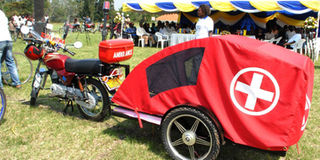2 Ugandans to be trained on leadership

One of the motorbike-ambulances that were launched by Christopher Ategeka’s venture, Cabikes last year. COURTESY PHOTO
What you need to know:
Skill. They were chosen for using innovative approaches to provide sustainable solutions that foster livelihoods and healthier communities.
Kampala.
Two Ugandans are among 23 young social entrepreneurs who have been picked from 15 Anglophone African countries to undergo leadership training in running social ventures.
“The goal is to bring people together with shared experiences but different perspectives to share the best practices on leadership,” Ms Jessica Elisberg, the programme manager for International Youth Foundation, one of the organisers of the week-long training in Entebbe, said.
“There is a lot of youth bias. People will not take you seriously if you are under 30. So our primary goal in to ensure visibility by empowering persons to interface with state players like government,” Ms Elisberg added.
One of the beneficiaries, Mr Christopher Ategeka, 28, has helped hasten access to emergency healthcare in his remote rural area in Kabarole District by introducing bike ambulances.
Mr Ategeka’s bike ambulances deliver medicine to patients and health centres.
His social entrepreneurship in healthcare was one born of a traumatic personal experience.
His father died of a common cold while his mother of HIV/Aids. Within a year, his brother passed on while walking to the hospital.
Mr Ategeka turned his misfortune around to reinforce swift and timely action to saves lives.
Mr Robert Okodia, 27, a beekeeper running the Aryodi Bee Farm under the Adyaka Rural Youth Development Initiative (ARYODI) also stood out in the pool of hundreds of applicants whose enterprises in their communities have solved local problems.
Mr Okodia witnessed communities in northern Uganda being devastated by war.
Its consequences such as unemployment, lack of education and poor health, however, compelled him to act.
Using a market-based approach to address these multiple dimensions of poverty, Mr Okodia began the beekeeping and honey production operation in Aminocira Village, Adyaka parish, Amac Sub-county in Erute South, Lira District.
Today, his venture employs 20 youths and works with more than 500 others as suppliers.
“We offer training and a resource centre where youth and women are trained in bee keeping as a business, developing group businesses, entrepreneurship skills, group dynamics, and life skills,” Mr Okodia said.
The participants are being trained on how they can be the agents for change in their societies by pursuing suitable solutions to social problems.
The programme is being fostered by Makerere University Business School in partnership with Usaid, The MasterCard Foundation and International Youth Foundation.
Christopher Ategeka:
He has more than 120 ambulances made from recycled or locally-sourced materials which have delivered low-cost emergency transport to more than 10,000 people.
Robert Okodia:
He views beekeeping and honey production as a tool to fight poverty through job creation and increase local agriculture outputs, bio-diversity enhancement and health benefits.



